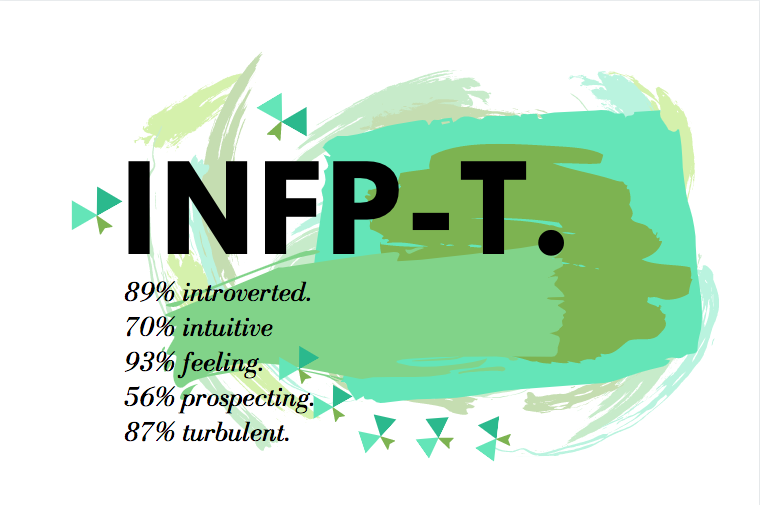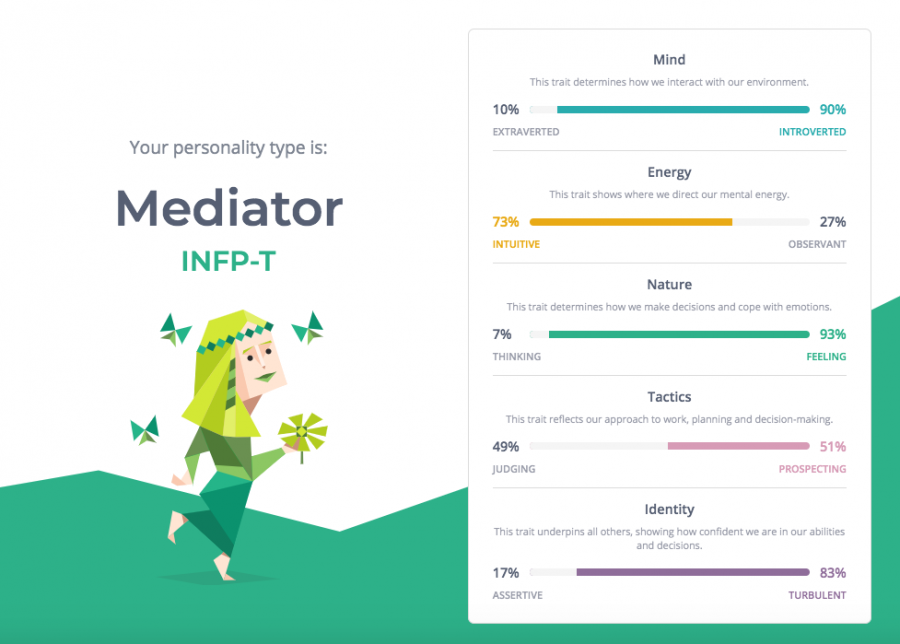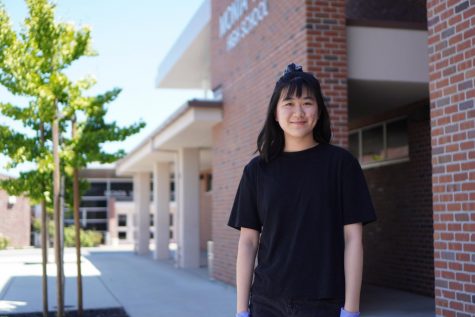The metamorphosis of self: How the Myers-Briggs personality test sheds light onto identity
Interpreting how the Myers-Briggs personality test gave insight into my definition of self
Graphic by Annie Zhang
October 1, 2019
INFP-T. 89% introverted. 70% intuitive. 93% feeling. 56% prospecting. 87% turbulent.
The Myers-Briggs personality profiling test, or 16Personalities, is a free 100 question test where users select answers from a scale of agree to disagree about a plethora of scenarios — social situations, what-ifs, career prospects and identity explorations. Taking into account user selections, the test then assesses the answer to each question and generates one personality type out of 16.
A personality type, according to Myers-Briggs, is categorized into five sections: mind (introverted versus extroverted), energy (intuitive versus observant), nature (thinking versus feeling), tactics (judging versus prospecting) and identity (assertive versus turbulent).
I first took the test in sixth grade for my own amusement — at the time, my naive 11-year-old self was an ever-changing bundle of awkwardness, social constipation and cringiness (I still am). I had just moved from Hayward to Cupertino, and was having trouble identifying myself in this newfangled community of Asians, boba and Musical.ly users. In the middle of a confusion haze, I took the 16Personalities test in a split second whim for the sake of classification and belonging. As I finished the hundredth question, my results appeared on the screen: “INFP: Mediator.”
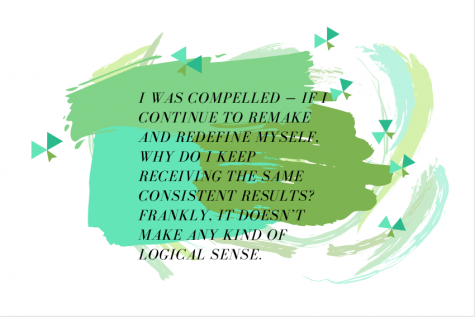 Over the course of time between then and now, I’ve taken the 16Personalities test dozens of times, with each result being a cookie cutter of my last result. I get the exact same personality type with almost the exact same percentages in a category every time, varying only by two to ten percent at most.
Over the course of time between then and now, I’ve taken the 16Personalities test dozens of times, with each result being a cookie cutter of my last result. I get the exact same personality type with almost the exact same percentages in a category every time, varying only by two to ten percent at most.
This summer at a journalism camp, every person on staff was prompted to take the Myers-Briggs personality test to analyze the facets and features of certain personality types in a journalistic work setting. At the time, I thought that summer was a period of rejuvenation, healing and self discovery; summer was transformative, as I reevaluated my core values and kept my mental health in check for once. Going into the test, I predicted that my percentages would run haywire, and I would maybe even receive a different personality result for once in my life.
Surprisingly, that was hardly the case. I was shocked to say the least that I received the same result with the near same percentages, despite the “changes” that I thought I underwent. I was compelled — if I continue to remake and redefine myself, why do I keep receiving the same consistent results? Frankly, it doesn’t make any kind of logical sense.
Ten-year-old me was gawky. Eleven-year-old me was indecisive and naive. Twelve-year-old me was socially inept. Thirteen-year-old me was angsty. Fourteen-year-old me was a heap of self deprecation. Fifteen-year-old me was a mound of sadness and sarcasm. These versions of me are all people that I used to know, but are people that I know so familiarly and so intimately.
Indeed, my personality fluctuated as I got sucked into the chasm of obnoxious social media trends, “stan Twitter talk” and pubescent humor. My fashion style underwent a cascade of cringeworthy phases from wearing neon athletic shirts to sporting all black outfit. My favorite color changed from pink to purple to turquoise to gray to black to pale orange over the years.
I broke many promises the past me would’ve repulsed — at age 10, I swore to myself that I wouldn’t say the words “dude” or “yo,” but now I use these 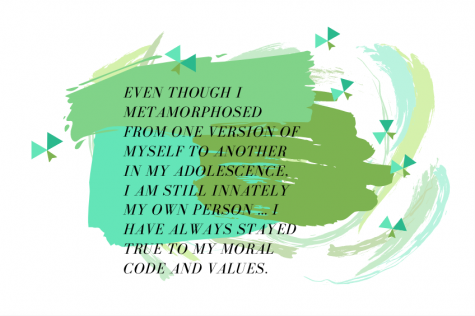 phrases nearly every other sentence.
phrases nearly every other sentence.
I swore to my past selves that I wouldn’t wear all black apparel, long Nike socks or necklaces, redownload Dragonvale, take CS classes, make a Facebook account or get bangs. Yet time after time, I find myself evolving into someone unrecognizable. I find myself hating my height and then dealing with it over the course of time; I find myself hating my deep borderline masculine voice to somehow accepting it by brushing off the “why does your voice sound like a man” question and by being a little tone deaf.
Even though I morph from one version of myself to another in my adolescence, I am still innately my own person. Even amidst the change that engulfs me, I have always stayed true to my moral code and values, as what I’ve come to understand that the Myers-Briggs test predicts. I am still a shell of my past selves, a melting pot of all the identities I used to be. I am still myself — I still say thank you after every favor, bow slightly when interacting with people my senior and tell no white lies.
At age 16, I am still indecisive, socially constipated, angsty, self deprecating, sad and sarcastic as I try to be. Even if I may change into another person outwardly and shed my current self like a snake skin, I am still the same person — just like how the Myers-Briggs personality test predicts.
All graphics by Annie Zhang


